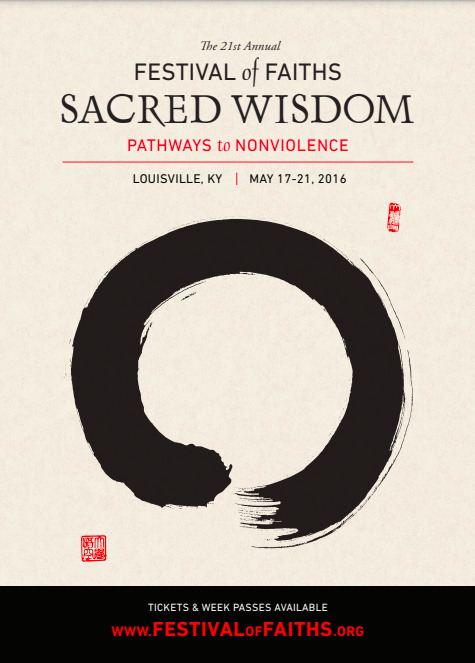The Center for Interfaith Relations is revisiting Festival of Faiths catalogues in search of insight, wisdom and inspiration. Our hope is that these written words will spur meaningful reflection and serve as a beacon of hope amid challenging times.
“Letters to a White Liberal” (excerpt) by Thomas Merton
From the 2016 Festival of Faiths, “Sacred Wisdom: Pathways to Nonviolence”

How is Christianity involved in the Negro struggle? Dr. Martin Luther King has appealed to strictly Christian motives. He has based his non-violence in his belief that love can unite men, even enemies, in truth. That is to say that he has clearly spelled out the struggle for freedom not as a struggle for the Negro alone, but also for the white man. From the start, the nonviolent element in the Negro struggle is oriented toward “healing” the sin of racism and toward unity in reconciliation. An absolutely necessary element in this reconciliation is that the white man should allow himself to learn the mute lesson which is addressed to him in the suffering, the non-violent protest, the loving acceptance of punishment for the violation of unjust laws, which the Negro freely and willingly brings down upon himself in the white man’s presence, in the hope that the oppressor may come to see his own injustice.
The purpose of this suffering, freely sought and accepted in the spirit of Christ in the liberation of the Negro and the redemption of the white man, blinded by his endemic sin of racial injustice. In other words, the struggle for liberty is not merely regarded by this most significant sector of the Negro population as a fight for the political rights. It is this, and it is also much more. It is what Gandhi called Satyagāha – a struggle first of all for the truth, outside and independent of specific political contingencies.
The mystique of Negro nonviolence holds that the victory of truth is inevitable, but that the redemption of individuals is not inevitable. Though the truth will win, since Christ is has already conquered, not everyone can “come to the light” – for is his works are darkness, he fears to let them be seen.
The Negro children of Birmingham, who walked calmly up to the police dogs that lunged at them with a fury capable of tearing their small bodies tot pieces, were not only confronting the truth in an exalted moment of faith, a providential Kairos. They were also in their simplicity bearing heroic Christian witness to the truth, for they were exposing their bodies to the death I order to show God and man that they believed in the just rights of their people, knew that those rights had been unjustly, shamefully and systematically violated, and realized that the violation called for expiration and redemptive protest, because it was an offense against God and His truth.
They were stating clearly that the time had come where such violations could no longer be tolerated. These Negro followers of Dr. King are convinced that there is more at stake than civil rights. They believe that the survival of America is itself in question. They believe that the sin of white America has reached such a proportion that it may call down a dreadful judgement, perhaps total destruction on the whole country, unless atonement is made.
These Negroes are not simply judging the white man and rejecting him. In the contrary, they are seeking by Christian love and sacrifice to redeem him, to enlighten him, so as not only to save his soul from perdition, but also to awaken his mind and his conscience, and stir him to initiate the reform and renewal which may still be capable of saving our society. But this renewal must be the work of both the white and the Negroes together. It cannot be planned and carried out by the white man alone or even by the Negro under the white man’s parental guidance. It demands some Negro initiative. The Negro is not going to placated with assurances of respect and vague encouragement from our side. He is going to make sure that we are listening and that we have understood him, before he will believe in our attempts to help….
Here is the radical challenge of Negro nonviolence today. Here is why it is a source of uneasiness and fear to all white men who are attached to their security. If they are forced to listen to what the Negro is trying to say, the whites may have to admit that their prosperity is rooted to some extent in injustice and in sin. And, in consequence, this might lead to a complete re-examination of the political motives behind all our current policies, domestic and foreign, with the possible admission that we are wrong. Such an admission might, in fact, be so disastrous that its effects would dislocate our whole economy and ruin the country. These are not things that are consciously admitted, but they are confusedly present in our minds. They account for the passionate and mindless desperation to evade the implications of our present crisis.
[/fusion_text][/fusion_builder_column][/fusion_builder_row][/fusion_builder_container]
